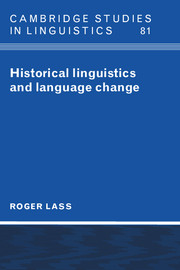Book contents
- Frontmatter
- Contents
- Preface
- Conventions, abbreviations and symbols
- General prologue: time travel and signal processing
- 1 The past, the present and the historian
- 2 Written records: evidence and argument
- 3 Relatedness, ancestry and comparison
- 4 Convergence and contact
- 5 The nature of reconstruction
- 6 Time and change: the shape(s) of history
- 7 Explanation and ontology
- References
- Index of names
- Subject index
- Frontmatter
- Contents
- Preface
- Conventions, abbreviations and symbols
- General prologue: time travel and signal processing
- 1 The past, the present and the historian
- 2 Written records: evidence and argument
- 3 Relatedness, ancestry and comparison
- 4 Convergence and contact
- 5 The nature of reconstruction
- 6 Time and change: the shape(s) of history
- 7 Explanation and ontology
- References
- Index of names
- Subject index
Summary
I do feel … that I now have a better understanding of what the key problems are than I did ten years ago. At times I even persuade myself that I can glimpse some of the answers, but this is a common delusion experienced by anyone who dwells too long on a single problem.
(Francis Crick, The astonishing hypothesis (1994))As long as I can remember I've been besotted with the past: artistic, linguistic, biological. Especially the latter two. For a time it was a tossup whether the preadolescent dinosaur-freak-cum-pedant would become a palaeontologist or a philologist; after years of mistaken career choices, including a spell as a literary medievalist, I ended up a linguistic historian (so a palaeontologist of sorts). And over the years this fascination with the past itself was joined by an equal fascination with the often devious ways we come to know about it. (Even such a brief autobiography may breach decorum, but it explains some of the odder properties of this book.)
These loosely connected but thematically unified essays are a kind of retrospective on nearly three decades of both being a historical linguist and worrying about the epistemic pretensions of what historical linguists do. In them I revisit some landscapes I've been prowling for years (now I hope with a more mature and cultivated eye), as well as exploring some new (garden?) paths.
- Type
- Chapter
- Information
- Historical Linguistics and Language Change , pp. xiii - xxPublisher: Cambridge University PressPrint publication year: 1997



